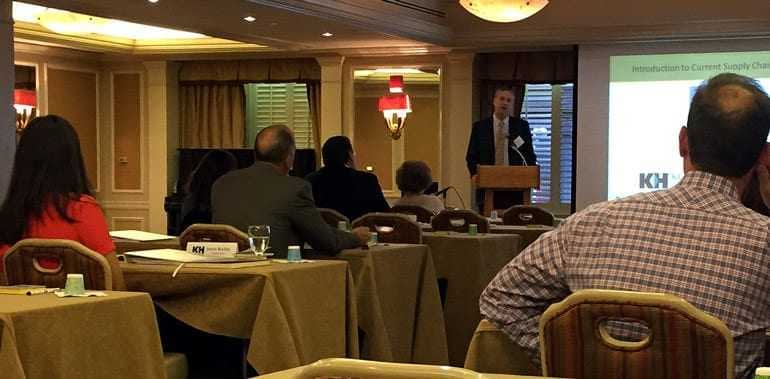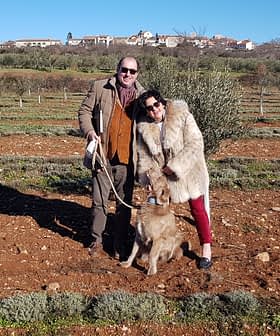A conference held at New York’s Cornell Club by a San Francisco law firm last week outlined the perils of the olive oil trade and cautioned anyone who sold or distributed it to know what they are doing.
Only 23 attended the conference, 11 of which were the speakers themselves, but among the non-speakers were buyers from Whole Foods Market, Trader Joe’s, Fairway Market, Fresh Direct, and Kehe Distributors.
“Hungry lawyers walk down the food aisles looking for targets,” warned Christopher Van Gundy, a partner at Keller and Heckman, the firm that organized the event, as he laid out his case for greater vigilance on behalf of importers, distributors and retailers. “Everyone in the supply chain is liable.”
File a sensory and chemical test for every brand you sell.
Backing him up was a procession of speakers including Extra Virgin Alliance co-founders Alexandra Devarenne and Paul Miller, American Oil Chemists’ Society chief science officer Richard Cantrill, Brown University assistant professor of medical science Mary Flynn, Gaea North America CEO David Neuman and Maria Reyes from KeHE Distributors.
Eryn Balch, from the North American Olive Oil Association, was scheduled to present at the conference but was not in attendance.
“There’s an awful lot of money missing,” began Paul Miller, who as president of the Australian Olive Association waged a campaign against the deceptive labeling of supermarket brands. Despite a clear demand trend toward quality around the world, he pointed out, the value of EVOO has paled in comparison to other cooking oils.

Christopher Van Gundy, a partner at Keller and Heckman, addressed attendees of a conference, “Defending Your Supply Chain: The Case of Extra Virgin Olive Oil,” at Cornell Club in New York
That’s because some producers are passing off cheap oils as extra virgin and dumping it on store shelves where consumers stand little chance of getting what they pay for, Miller argued.
The only way to prevent deception, and the liability merchants face as fraud cases loom, is to monitor quality and manage it throughout the olive oil’s shelf life. “The future of the industry is testing off the shelves,” he said.
Once major retailers begin testing products off the shelves, the problems go away, he said, citing examples such as the German retailer, Aldi, who regularly tests using the PPP and DAGs methods developed by Christian Gertz of the Official Institute of Chemical Analysis.
“As a buyer, you need to know as much or more than your vendors or you will lose the upper hand,” said David Neuman, the CEO of the North American subsidiary of the Greek brand, Gaea.
Neuman, who led Lucini Italia until it was sold to California Olive Ranch earlier this year, said retailers should be conducting regular testing to demonstrate due diligence in case they’re called out on the quality of products on their shelves.
“File a sensory and chemical test for every brand you sell,” Neuman suggested, adding that retailers should bill back producers for the added costs.
With producers of high-quality extra virgin olive oil struggling to get their products to consumers at prices that make it worth the great effort necessary to produce it, Alexandra Devarenne, the EVA co-founder and consultant, blamed a “senseless downward spiral” dragging the industry to its lowest common denominator.
Devarenne said that if olive oil bottles identified the true grade of their contents, “we would have a vigorous trade in virgin olive oil in the U.S.” — a grade, she argued, that consumers already like using — leaving properly labeled extra virgin to reflect its true value and command the higher prices necessary to sustain the industry. “Why put lipstick on your pigs,” she asked, “when you can sell bacon?”
Maria Reyes, who said she grew up knowing nothing about olive oil, but as vendor management director at KeHE Distributors has taken a special interest in the category and its potential, said the growth of the $3 billion specialty foods distributor was in the “higher categories.”
She recommended that retailers add more variety to the specialty olive oil section to achieve higher profits and provide healthier products for customers.








